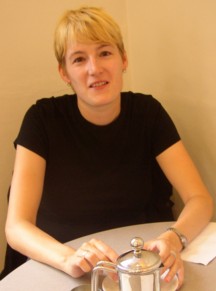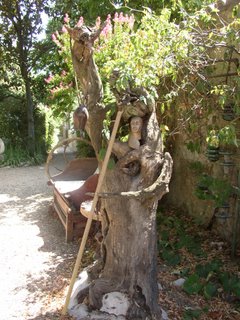In 2004 I received a couple of grants to visit Patagonia in order to research the novel I was writing. I wanted to interview people of Welsh descent to try and find out how the colony over there was established. After a little investigation on the internet I contacted the
British Council. They have a scheme to re-introduce the Welsh language to the people there and every year send out experienced Welsh teachers to take classes for both adults and children. There is great interest and the classes are very popular.
Through the British Council I was able to contact people over there and I spent a wonderful fortnight travelling around the place listening to their stories.
The
British Council deals with creating educational and cultural opportunities for people in the UK and overseas to learn about each other and run a range of programmes both in the UK and abroad. Their website is quite extensive but with a couple of clicks on 'Arts' you will come across
'Encompass Culture' and inside that their
'Reader In Residence', Susan Tranter.

I was delighted when Susan made contact with me after coming across my blog (on
Grumpy Old Bookman's blog); and since I have always been curious about the British Council and Encompass Culture in particular I asked her if she would mind if I interviewed her and she kindly agreed.
As mentioned before we met in the Manchester Art Gallery and had quite a long chat which I enjoyed very much - it so good to meet a fellow blogger.
INTERVIEW WITH SUSAN TRANTEROn being 'Reader in Residence'CD: How did you get to be "Reader in residence"?ST: It was very simple, really - the job was advertised and I applied for it. I'd been a literature officer in Cumbria, and worked on all sorts of projects for aspiring writers and reading groups, and started a small press and all that kind of stuff.
CD: Was that with the British Council as well?ST: No that was with Cumbria County Council - a lot of local authorities have their own Literature Officers - as you probably know.
CD: What do you do as a 'Reader in Residence?'ST: Well, I keep the content of the site fresh - there are certain things I put up on a regular basis:
the book of the month,
a monthly newsletter,
an author interview, a themed readers' quiz - by genre or country, a news update. And of course there's the
Encompass Culture blog and I host on-line chats with
readers groups around the world.
CD: That sounds good.ST: Yes it's pretty cool.
It's live, so it's really exciting. Readers in Tashkent, for instance can
chat about a book with readers in Blackburn - and everyone is equally articulate and enthusiastic. It's a good example of technology working - a bit like blogging, really - something really worthwhile that you couldn't do any other way.
CD:. What is your typical day?ST: There isn't one, really. I might surf websites for book news, then read - that's part of the job, but no hardship, really! Do some blogging, then all the rest of the stuff I've mentioned - the author interviews, the newsletter and so on.
CD: Do you choose your own timetable, then?ST: Yes. It's supposed to be one day a week - but it cuts in through lots of days. I've no idea what it works out as.
http://www.blogger.com/img/gl.link.gif
CD: Do you do other work for the British Council?ST: No I work from home, free-lance on a variety of things - like other editorial work, research and copy-editing.
CD: How do you choose the books you read?ST: For the British Council they've got to be books listed on the
Encompass site. These are books by British and Commonwealth authors in the main. I then check that they are current and available in the library - because I'm very much a library user. And then, personal interest, I suppose.
CD: How do you choose books for yourself?ST: Pretty serendipitously, really. One book may lead to another, or I might like the sound of a title or heard a random anecdote about the author.
CD: Are you influenced by newspaper reviews? ST: No. I don't really read them. I usually buy the Guardian on a Saturday and look through the book section in there, but find I'm reading this less and less these days.
CD: How influential do you think newspaper book reviews are?ST: Not very. I suppose that old adage that bad book reviews are more influential than good reviews is probably true, but I just scan them, really.
 CD: Do you think blogging is going to become more important?
CD: Do you think blogging is going to become more important?ST: Yes. A good example is that
initiative by Susan Hill, the ‘Bloggers’ Book Award’ - have you seen it? It'll be interesting to see what comes of that.
CD: Where do you buy your books?ST: I don't buy many books actually. I'm an avid library user. I've also become obsessed with the on-line catalogue. I don't even have to walk up and down shelves trying to find the book. I can just find what I need from home.
CD: Do you have any involvement with reading groups?I used to be in one, and I used to be involved more in my previous job, but my only contact now is when I host the on-line chats.
CD: Are these reading groups organised by the British Council?ST: Yes they tend to be groups affiliated to the British Council world-wide. Reading groups can ask to be paired up with other groups across the world. And then sometimes they have an on-line chat with the author of the book the groups have just been reading.
CD: How do they get to hear about the chat?ST: Through the site, really. Recently we had a big promotion called Africa 21 which promoted African writers and books about Africa. British groups were able to talk to groups in Africa and they could ask questions associated with the book – everything from big issues to finding out about local words that kept cropping up in the text. It was fascinating - a great cultural exchange.
CD: What exactly is Encompass Culture? ST: An international reading group and a resource for people to find out which books to read, help people choose books and interact with other people. At its heart is a huge database. The ‘EnCompass’ comes from the idea of a compass with a pointer to select different categories books for adults, teenagers and children - and different genres and authors. I don't choose the books listed on it by the way - that's another person's job!
CD: What is the difference between the Encompass newsletter and the Encompass weblog?ST: The monthly newsletter is a round up of news; whereas the weblog contains my opinions and thoughts. The newsletter is objective, the blog subjective.
CD: How many questions do your get from readers a month? ST: There's quite a wild variation - from about 1 to 12 or more a month. They could be from anywhere - it's difficult to track. The questions can be on anything from the specific, e.g. the name of an author who wrote a certain book - to the more general or bizarre, e.g. someone might ask: ‘I remember reading a great book once with the word 'donkey' in it - do you know what it is?'
I find the blog does encourage more feedback in response to what I say. For instance when I put up that plea for books on gardens the other day - 4 people responded - all writers, oddly enough.
CD: Have you got any tips for 'writers in residence'?'ST: Make connections and find out who can help. That way you don't feel as if you are in a vacuum and are not so isolated. Make the most of your time in the place, and don't feel driven to 'give something back' at the expense of your own writing or research time.
CD: What are your favourite books?ST: I like all those hard-bitten miserable American writers: Hemingway, Carver, O'Connor, and McCarthy.
CD: Do you think that being based in Manchester rather than London gives you a different perspective on the world of books (I'm very proud of this question)?ST: No! Since I work freelance I can work anywhere really. I don''t have much interaction with publishers, and I'm the sort of person who prefers to visit London rather than live there. And I like Manchester. It's a good place to watch what's going on, and it's easy to get to know people.
CD: How do you help readers find their next book? Have you had any feedback on this?ST: The odd person has written back, and I'm always grateful for feedback. One person commented that she had gone to see an event at the Edinburgh fringe on my recommendation which was exciting.
 On Susan Tranter...CD: Do you have any connection with snails?
On Susan Tranter...CD: Do you have any connection with snails?ST: Well I hope I'm going to start copy-editing an academic paper on snails in Shakespeare. 65 000 words. I think it's someone's PhD they are hoping to convert into a book.
CD: I shall be interested to read that. What is your proudest moment?ST: I have a poem dedicated to me by the poet Jacob Polley whose first collection,
THE BRINK was published in 2003.
CD: Have you ever had a life-changing event - if so what was it?ST: (Laughs) blogging!
CD: If there was one thing you’d change about yourself what would it be?ST: I'd be bilingual. Half my family is Finnish and I can hardly speak to them.
CD: What is the first thing you do when you get up?ST: Make my partner's lunch.




















































